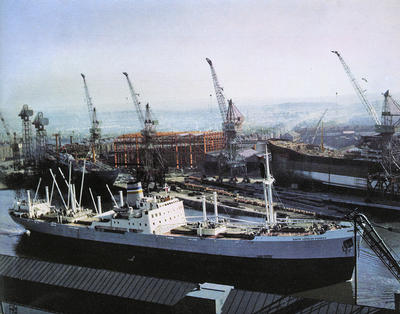
A view of the Fairfield Shipbuilding & Engineering Co's shipyard looking south, c 1955. The ship in the foreground is the 9,538-tons cargo vessel South African Pioneer, passing the yard where she was launched in 1953. The ship was owned by the South African Marine Corporation (Safmarine).
The 1950s saw a complete reorganisation of the layout of the Fairfield shipyard, when shipbuilders adopted methods similar to a factory assembly line. Techniques developed during the Second World War allowed large sections of a ship to be welded together. These sections could be assembled under cover before being transported to the berth.
The main fitting-out workshops were the first to be reorganised, in 1954, to provide more working space and a proper flow of work. Then the six building berths were rearranged into five and a concrete roadway, 40 feet wide, was laid between berths that were equipped with travelling cranes capable of lifting up to 80 tons. The third stage, carried out towards the end of the decade, was the complete replacement of the steelwork workshops, providing more space and light.
Reference: Mitchell Library, G 623.809 FAI
Reproduced with the permission of Glasgow City Council, Libraries Information and Learning
Keywords:
cargo ships, cranes, Fairfield Shipbuilding & Engineering Co, Fairfield Shipyard, fitting-out basins, marine engineering, River Clyde, Safmarine, shipbuilders, shipbuilding, shipyards, South African Marine Corporation, South African Pioneer, steel, workshops
You have 0 images in your photo album.